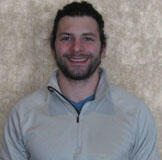
Elias Boroda
Thesis Title:
Modulating Human Brain Plasticity with Transcranial Direct Current Stimulation (tDCS): Basic and Clinical Applications
Current Position:
Research Scientist, Datacubed Health
Previous Position:
Postdoctoral Researcher, Department of Psychiatry at University of Minnesota
Undergraduate Institution and Major:
University of St. Thomas, Neuroscience B.S 2013
Graduate Advisor:
Kelvin Lim, M.D., Department of Psychiatry
Graduate Publications:
- Boroda E, Armstrong M, Gilmore CS, Gentz C, Fenske A, Fiecas M, Hendrickson T, Roediger D, Mueller B, Kardon R, Lim K. Network topology changes in chronic mild traumatic brain injury (mTBI). Neuroimage Clin. 2021 May 5;31:102691.
- Boroda E, Krueger AM, Bansal P, Schumacher MJ, Roy AV, Boys CJ, Lim KO, Wozniak JR. A randomized controlled trial of transcranial direct-current stimulation and cognitive training in children with fetal alcohol spectrum disorder. Brain Stimul. 2020;13(4):1059-1068.
- Boroda E, Sponheim SR, Fiecas M, Lim KO. Transcranial direct current stimulation (tDCS) elicits stimulus-specific enhancement of cortical plasticity. Neuroimage. 2020 Feb 4:116598.
- Mervis JE, Capizzi R, Boroda E, MacDonald AW. Transcranial direct current stimulation of the dorsolateral prefrontal cortex in schizophrenia: A quantitative review of cognitive outcomes. Front Hum Neurosci. 2017 Feb 2;11:44.
- Nelson BG, Boroda E, Lim KO. Implementation of a platform-agnostic working memory span task using mobile device technology. 2016 IEEE Wireless Health (WH), Bethesda, MD, 2016, pp. 1-7, doi: 10.1109/WH.2016.7764562.
Graduate Level Abstracts:
Oral Presentations:
- Boroda E. A modern software framework for cognitive task development. 2016 IEEE Wireless Health, NIH, Bethesda, MD, 2016.
Posters:
- Boroda E, Lim KO. Modulating cortical plasticity using tDCS. Annual meeting of the Society for Biological Psychiatry, New York City, NY. 2018
- Boroda E, Nelson BG, Lim KO. Platform agnostic variant of the 4-choice reversal learning task. Wireless Health 2016
- Nelson BG, Boroda E, Lim KO. Implementation of a platform-agnostic working memory span task using mobile device technology. Wireless Health 2016
Graduate Level Awards and Honors:
- Integrative Graduate Education and Research Traineeship (IGERT). University of Minnesota, Institute for Engineering in Medicine and the National Science Foundation. September 2015 – August 2017.
Thesis Committee Members:
- Matthew Chafee, Ph.D., Department of Neuroscience (Chair)
- Angus MacDonald, Ph.D., Department of Psychology
- Kelvin Lim, M.D., Department of Psychiatry
- Hubert Lim, Ph.D., Department of Biomedical Engineering
- Scott Sponheim, Ph.D. Department of Psychiatry
Description of Graduate Research:
I am exploring means to induce plasticity in both healthy and diseased neuronal populations to enhance cognitive function. I am studying the ability to modulate human cortical plasticity using transcranial electrical stimulation
Research Categories:
- Behavioral and Cognitive Neuroscience
- Neuroengineering
- Neuropsychiatric Disease
Rotations:
- Kelvin Lim, M.D., Department of Psychiatry
- Bin He, Ph.D., Department of Biomedical Engineering
- Colum MacKinnon, Ph.D., Department of Neurology
Professional Outreach:
Brain Awareness Week Instructor 2014 and 2015.
Why Did You Choose MN?
It offers me the research tools I need to pursue my interests.
What Advice Would You Give a First Year Graduate Student?
Do what you are passionate about and always have your future in mind.
